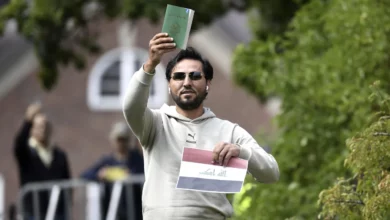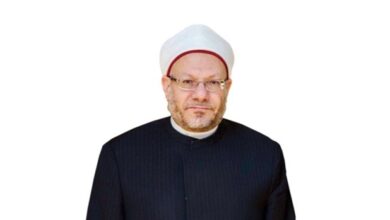Muhammad Abduh, a reknown Islamic thinker, leader, newspaper editor, and modernizer, remains extremely influential more than a century after his death, but still people don’t know a great deal about his life. Now, Mark Sedgwick, a former professor of history at The American University in Cairo (AUC), adds to the discussion with "Muhammad Abduh," a detailed new biography.
Abduh was born in Tanta in 1849; by the age of 12, he had studied the Quran extensively. At 16, he was married, and it was on the return from his honeymoon that he met a Sufi, an event that would change him forever. Abduh became a Sufi at heart, though he never revealed this transformation to his counterparts.
At the age of 17, Abduh moved to Cairo to pursue his education at Al-Azhar mosque. “At that time, the Azhar was an institution of crisis,” writes Sedgwick. Abduh disliked studying there, but he met Jamal al-Din al-Afghani, the Islamic thinker and activist who would become one of Abduh's mentors. Afghani gave private lectures to a small group of students, including Saad Zaghloul, who went on to become Prime Minister of Egypt.
From Abduh's days in political exile in Paris, to his following of the Mutazili Islamic sect, to his tenure as the grand Mufti of Egypt, Sedgwick's biography delves thoroughly into the life of the patriot and reformer.
Al-Masry Al-Youm spoke with Mark Sedgwick about one of the most important figures in Islamic history.
Al-Masry Al-Youm: Why did you chose to write about Muhammad Abduh?
Mark Sedgwick: I didn't actually choose him myself. Patricia Crone, a professor at Princeton, was editing a series of books about the most important figures in the history of the Muslim world, and asked me to write the book about Muhammad Abduh, because she’d heard and liked a lecture I gave which was about him and the "Islamic Reformation." Some people say that what Islam needs is a reformation, but I sometimes wonder whether Islam has actually already had a reformation, but nobody noticed. Whether or not this is the case, Muhammad Abduh was a crucial figure in the period when many important things changed a lot. So that's one reason why he’s interesting. But as well as being interesting, he’s also intriguing. There are so many different ideas about who and what he was. Writing about him—trying to find the “real” Abduh—was quite a challenge.
Al-Masry: What was unique about Abduh's life?
Sedgwick: He did, discovered, and experienced so much. He tried so much, even though in the end he perhaps failed; there is a certain tragedy about his life. What was so different about him, I think, was that he explored so much. He seems not to have been afraid of anything or anyone—not afraid of any idea, not afraid of the khedive, not afraid of the British. Perhaps he should have been more careful sometimes, but that lack of fear was part of his glory.
Al-Masry: How do you think Abduh's exposure to different Islamic sects such as Sunni, Shia, and Sufism shaped his character?
Sedgwick: I think that exposure was very important. Sufism was important in his youth, and then the Shia works he read with Afghani were probably the first things that really broadened his horizons. I don’t think that the point was that were Shia, actually, but that they were different—very different from the other things people were then reading, very different from what he himself had read before. One of the striking things about him is that he was interested in anything and everything, and I think that probably started with his exposure to unusual ideas as a young man.
Al-Masry: Do you consider Abduh a Mutazili or Shia or Sufi or none of those?
Sedgwick: None of these! I think he must have had some sympathy for the Mutazili, but he knew that they were different people from a very different age. The problems of his age were not theirs. Intellectually, he was certainly interested in some ideas of the Shia and the Sufis, but I don't think he ever identified with them, at least not after his youth, when he certainly considered himself a Sufi for a while. After that, I can't imagine him wanting to go to Tanta for the mawlid, or to Karbala! That thing was not his style at all. In the end, he was more of a regular Egyptian Sunni than anything else. Though he was never just a regular anything.
Al-Masry: What is the thing you feel is still hidden about Abduh's life?
Sedgwick: One day, somebody will find and go through his private papers. They must still exist somewhere. Then we will discover all sorts of things—and I’ll see whether my reading of him is right or not. What I would really love to know is what his personal spiritual life really was—how he felt about God and the Prophet and so on. We may never know that, though. Someone in the sort of positions he occupied is not free to reveal his private thoughts. And anyhow, how much do we know about the personal spiritual life of some people we know quite well?
Al-Masry: Tell us about you–your education, your current job, your interests, your hobbies, and your family.
Sedgwick: My education was first at Oxford, and then at Bergen, in Norway—already some variety, though not as much as Abduh, combining the Azhar (a sort of Oxford in terms of antiquity) with the University of Geneva! Nowadays I’m teaching Arab and Islamic Studies in Denmark. With all that’s going on in Europe at present in terms of public reactions to Islam, it’s most interesting to be here, if sometimes rather worrying. Fortunately, the students who I teach are different—they are interested and want to learn, as otherwise they would not have signed up for these studies in the first place. But sometimes when I am reading the newspapers here or listening to the news, I can hardly believe it. Hobbies and family? Yesterday I was clipping bushes in the garden with my young daughters… Pretty different from Egypt. But we all miss Egypt. When my youngest daughter experiences something she really likes, she says, “It’s just like Egypt!” Even if it isn’t.
Al-Masry: Tell us about your experience lecturing Egyptian students at AUC.
Sedgwick: Teaching Arab history to Egyptians was a fascinating experience. It was a sort of exchange. I taught them the history, and they taught me what it meant. Of course, some students were only sitting there because they had to, but some were really interested—interested in finding out how Egypt and the Arab world arrived at the positions they are in today. I know some people have an image of AUC students and their interests that is not very flattering, and in some cases there may be some truth in that image. But there are also students who are really bright, really dedicated, and really care about their country. To help students like that explore one aspect of the world around them was immensely rewarding.
Al-Masry: How do you think the Egyptians have changed since the era of Abduh?
Sedgwick: In some ways a lot, and in some ways not at all. Abduh lived in a Cairo where a tiny number of people, who all knew each other, made up the intellectual and religious and political worlds. Cairo has grown a lot since then–but actually, people in each world still do all know each other, even if the gaps between the different worlds have perhaps grown. Abduh's Cairo was more adventurous and open at the official level than today's, but in some ways today's Cairo is still quite adventurous, and sometimes even open, though not so much at the official level. One difference is the pace of change–so much changed in Abduh's lifetime. From Muhammad Ali to the motor car, via Ahmad Orabi and the British! Imagine! Certainly, things have changed a bit since Gamal Abdel Nasser's time, but not so much… And that has an impact. There’s a feeling nowadays that it is impossible to change things. I don’t think that’s how Muhammad Abduh and his friends felt.




